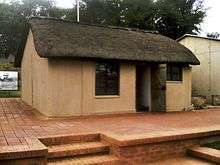Liliesleaf Farm
Coordinates: 26°02′38″S 28°03′13″E / 26.04389°S 28.05361°E

Liliesleaf Farm in northern Johannesburg, South Africa, was the farm used secretly by African National Congress activists in the 1960s and was the location where many prominent African National Congress leaders were arrested, leading to the Rivonia Trial. Nowadays Liliesleaf Farm is a Museum and world-famous Heritage Site, attracting many visitors annually, and rated as a top "things to do in Johannesburg" site.
In 1961, Lilliesleaf Farm in Rivonia was purchased by Arthur Goldreich and Harold Wolpe as headquarters for the underground Communist Party and a safe house for political fugitives. The purchase was made using South African Communist Party funds. Nelson Mandela needed a safe place from which to operate, and lived there under the assumed name of David Motsamayi as a worker in blue overalls employed by the owner to look after the farm.
On 11 July 1963, security police raided the farm and captured 19 members of the underground, charging them with sabotage. They were meeting in the thatched room, and were stunned by the raid.
George Mellis, the young son of the owner of the Rivonia Caravan Park, which lay opposite the entrance to Winston Avenue leading to the farm, saw cars coming and going and people of various races meeting and greeting each other. In those days that was sufficiently unusual for him to tell his family, and a string of reports, coincidences and rumours, and an informer in the military wing, led to the police raid.
The activists had already decided to move to another safe location, and this was to be the final meeting in the farmhouse. Nelson Mandela was already in prison, serving a sentence of several years for relatively minor offences, having been arrested the previous year. The police found documents during the raid incriminating Mandela. As a result, he was charged and brought to trial with the others.
The trial, which ran from October 1963 to June 1964, culminated in the imposition of life sentences for eight of the accused.
Liliesleaf Farm today
The farmhouse at Liliesleaf Farm has now been surrounded by the gradual spread of Johannesburg's suburbs, but the historic site has been reopened to visitors. The buildings have been restored to their earlier condition, and visual and audio-visual displays recreate the dramatic events leading up to the police raid, and the raid itself.
The farm is referred to either as "Liliesleaf" or "Lilliesleaf", with the former spelling used at the site itself.
References
External links
- Liliesleaf Farm Trust
- SA history re trial
- Audiovisual project
- Restoring the Farm - City of Johannesburg article
.jpg)